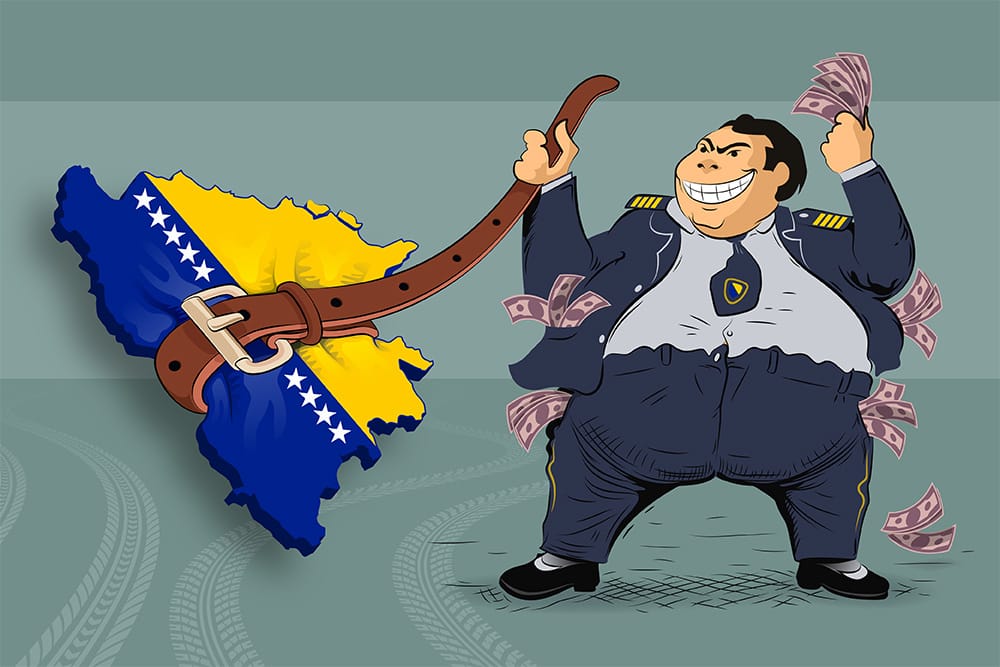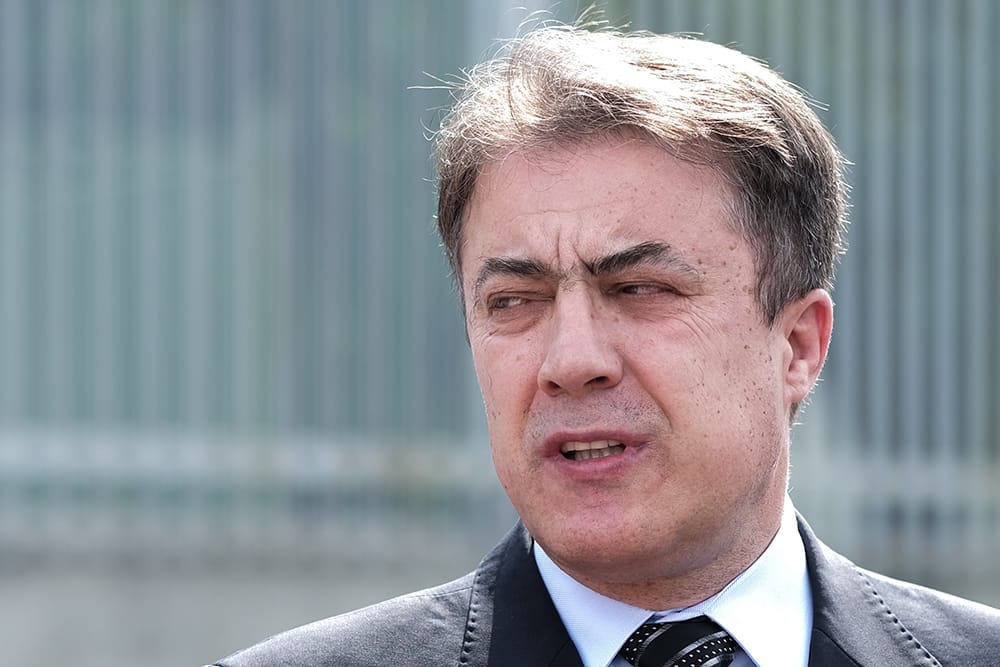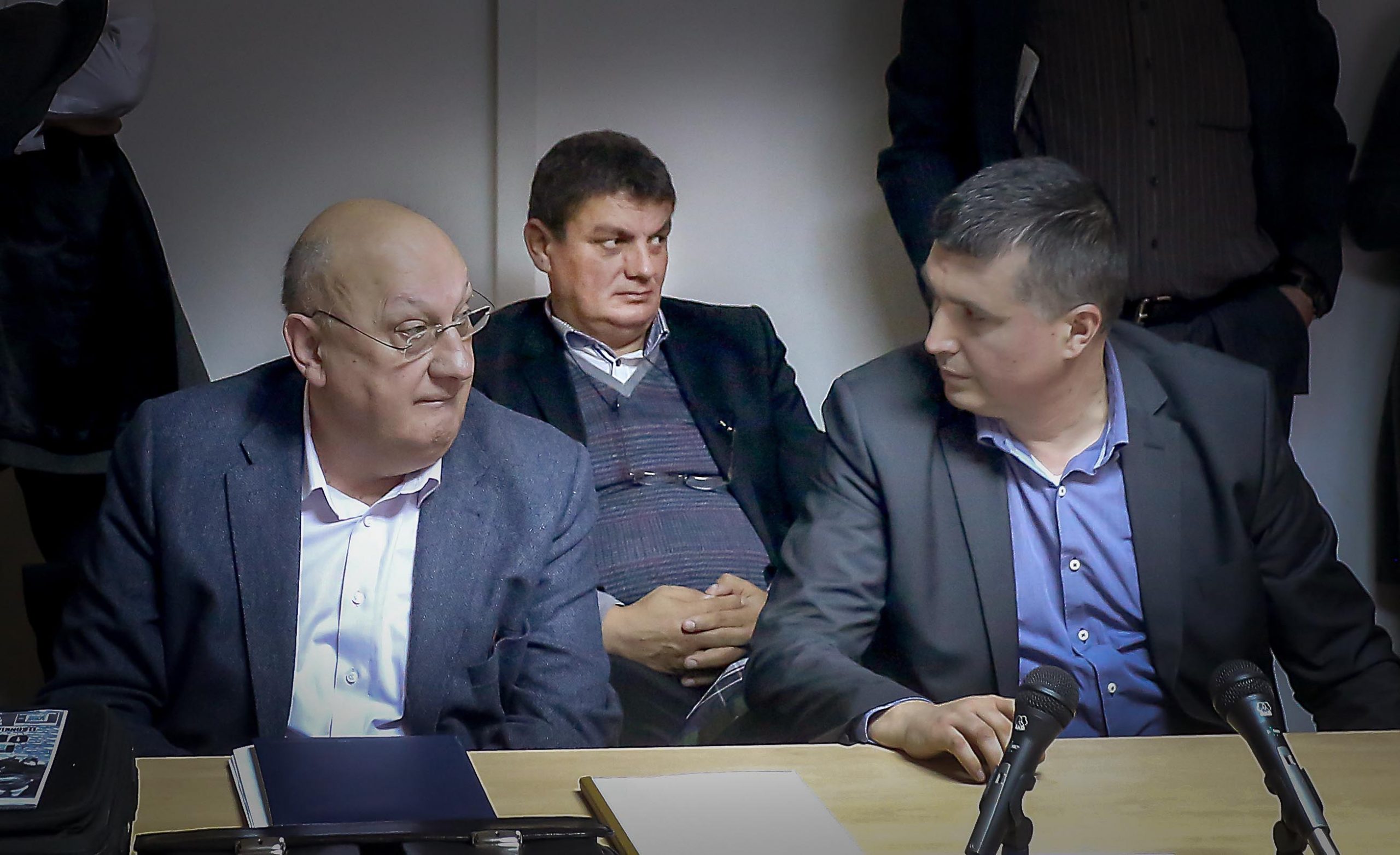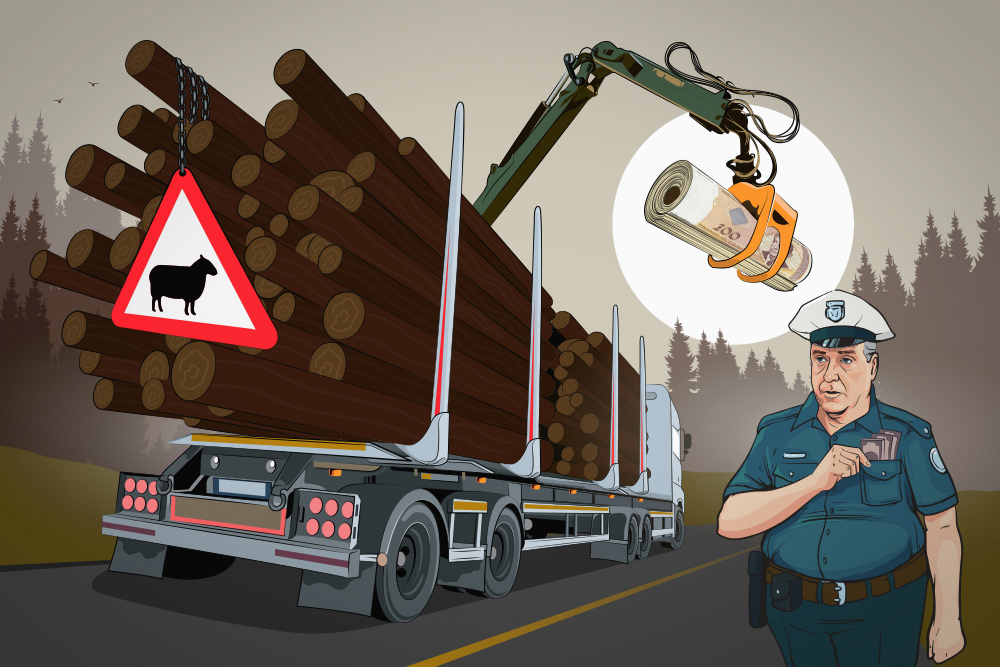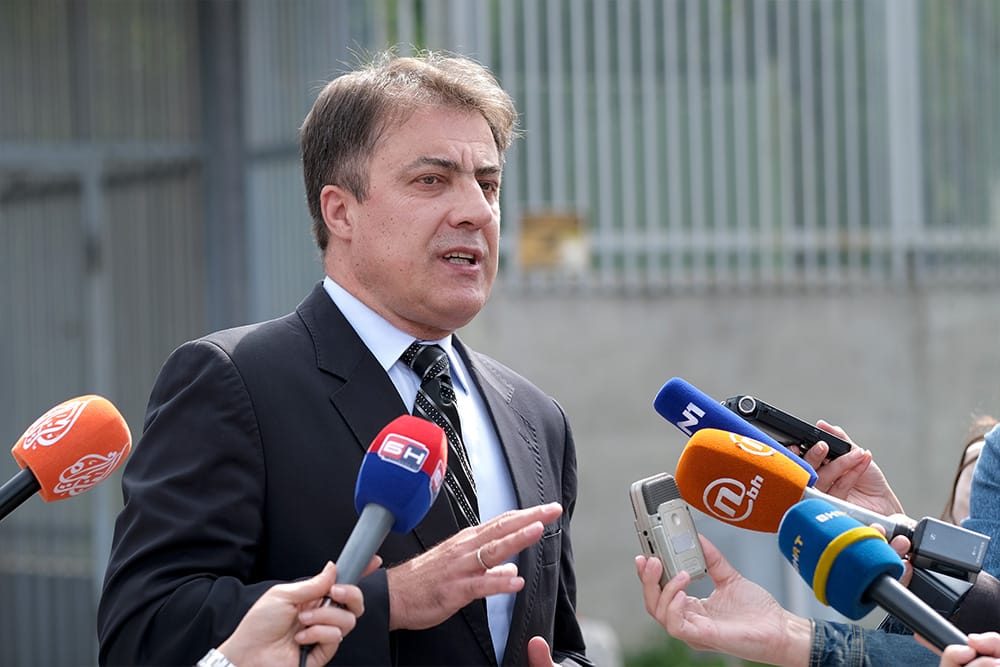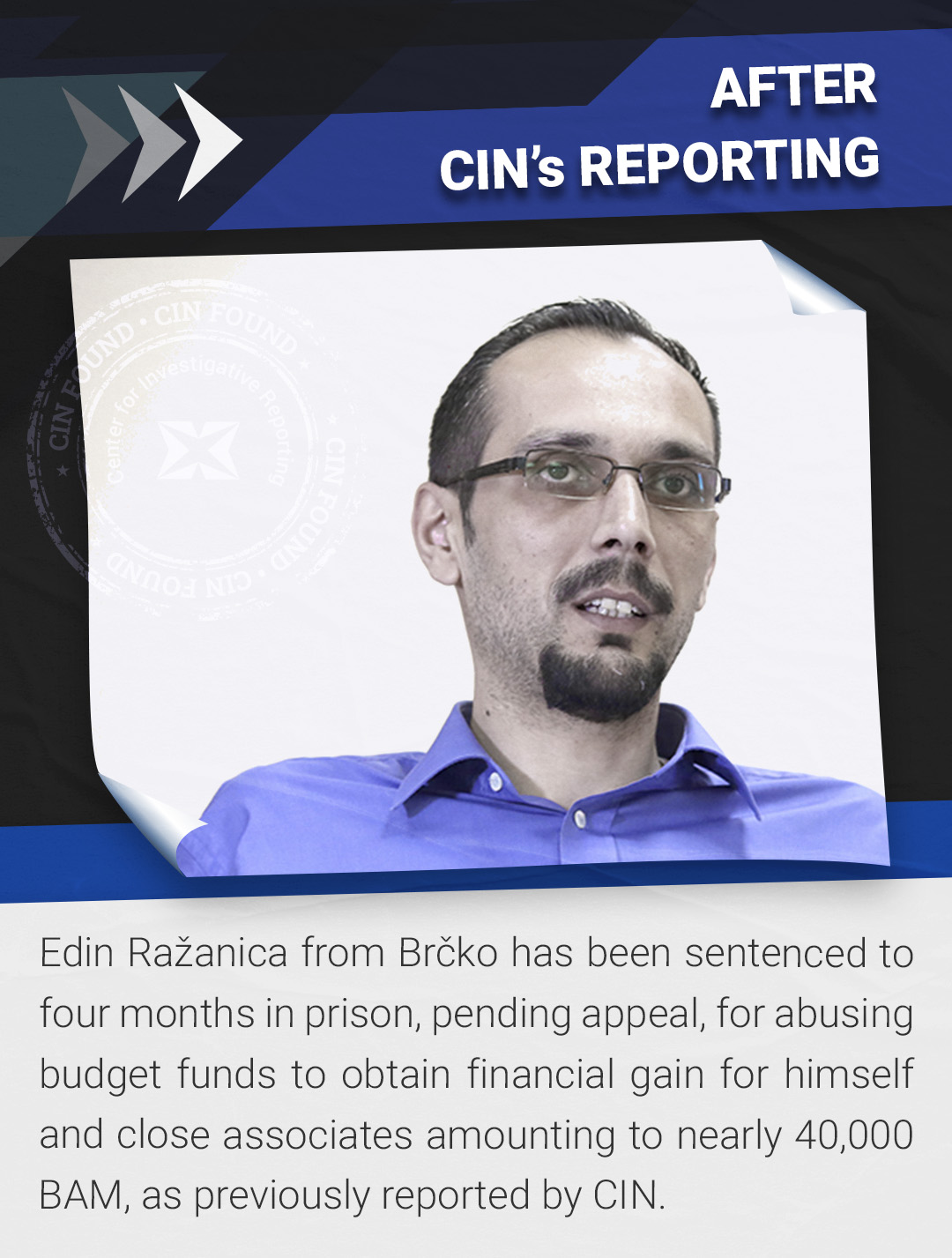At the beginning of 2020, Esnaf Kastrat from Sarajevo transported ten tons of Chinese textiles from Hungary to Bosnia and Herzegovina (BiH). The invoice that he was supposed to hand over to the customs officers stated that the average value of the goods was around BAM 6 per kilogram. It was not realistic, but an agreed price of goods for those willing to pay a kickback.
“No freight forwarding company will work with you unless you give them some “gratuity”, he said to CIN.
He tried to arrange cooperation with freight forwarders from Gradiška and Sarajevo earlier, but they rejected him. This time, upon a recommendation, he approached “Centrošped” from Gradiška, where the freight forwarding agent, Jelena Stanivuk explained to him that before the customs clearance, he has to leave “an envelope”.
“I told her that I am not that kind of guy!”
Kastrat remembers that the freight forwarding agent, after talking to the customs officer, offered him to pay only two thousand BAM instead of two and a half thousand, but he refused.
“She comes to me and throws the papers saying ‘You are exaggerating. No one is a fool. We all know that this is not the real value of the goods.’ Either you will give it [kickback] or he [the customs officer], will raise the taxable base. They’ll spoil your goods, they’ll let the dogs out!”
Having inspected the Kastrat’s consignment, the customs officers found the price on the invoice to be devalued, however, the fine was not too heavy for his pocket. He had to pay only about a thousand BAM more to the state budget because the customs officers established the price difference of only BAM 3.5 thousand more than indicated on the invoice.
Six years earlier, former director of the Indirect Taxation Authority (ITA) of BiH, Kemal Čaušević, importers Anes Sadiković, and Sedinet Karić, and many other customs officers were arrested for customs fraud and bribery. According to CIN reporters, these arrests and trials had no deterring effect on some individuals from ITA BiH, who continued to work in the same fashion. The importers have been importing goods from abroad – for which the local traders pay in cash – and presenting at the border false invoices with significantly reduced values of goods to pay as little taxes as possible to the state budget.
While large retail brands such as Waikiki and New Yorker import similar goods for about BAM 40 per kilogram, the largest domestic importers do so for about BAM 6 per kilogram. To turn a blind eye to what is obvious, freight forwarding agents collect ‘the envelopes’ on behalf of custom officers, claim CIN interlocutors, and the bribe-lubricated goods go through the customs quickly without being thoroughly inspected.
“In return for a BAM 2,500 worth ‘coffee gratuity’, the goods are custom cleared based on the invoice”, briefly explains the importer Edin Peljto, who paid the bribe.
In the last three and a half years, only at the border crossing in Gradiška, about 3.5 thousand tons of devalued textile goods were custom cleared, thus causing BiH to lose nearly BAM 38 million in customs duty. Nearly half of that volume was imported by the company Extrablatt owned by Ferhat Pero Peštalić. The price of BAM 6 per kilogram was set by the ITA BiH, he says. This institution denies the existence of any such regulation, but Peštalić argues that “they did it unlawfully then.”
In 2017, SIPA filed a report suspecting Peštalić and Besim Jahić, a man who is behind the company “Hisar trade”, of organized crime, bribery, and tax evasion related to textile imports, but the BiH Prosecutor’s Office to date has not pressed any charges. They are both on the list of top importers. CIN interlocutors describe Peštalić as “the king of textile”, a man with the strongest ties within ITA BiH and other institutions.
Punishment for the disobedient
Esnaf Kastrat knew everything about textile import. He had friends in the right places and was defiant enough to play with the system. He entered the importing business to do a favor to Edin Helać and help him keep his business, as Helać’s company Europtimus was struggling with tax debt. He knew immediately that the work was not legal.
“You go and buy goods, you’ll pay a pair of sneakers EUR 10, but the invoice will say EUR 2.5. It is what it is. It was not me who came up with this”, says Kastrat.
The goods which boutique owners bought, paying in cash at the markets of Turkey, Hungary, or Italy, are taken over by the importers at parking lots abroad. Then, together with the local company i.e., the vendor they weigh it and make a false invoice with the total value always being BAM 6 per kilogram of Chinese, and BAM 8 of Turkish goods. The price, they claim, was set by the ITA BiH.
This means that the false invoice for 10 tons of textiles worth BAM 200,000 will say BAM 60 thousand, hence instead of paying BAM 65,000 in customs duty, they pay only BAM 20,000.
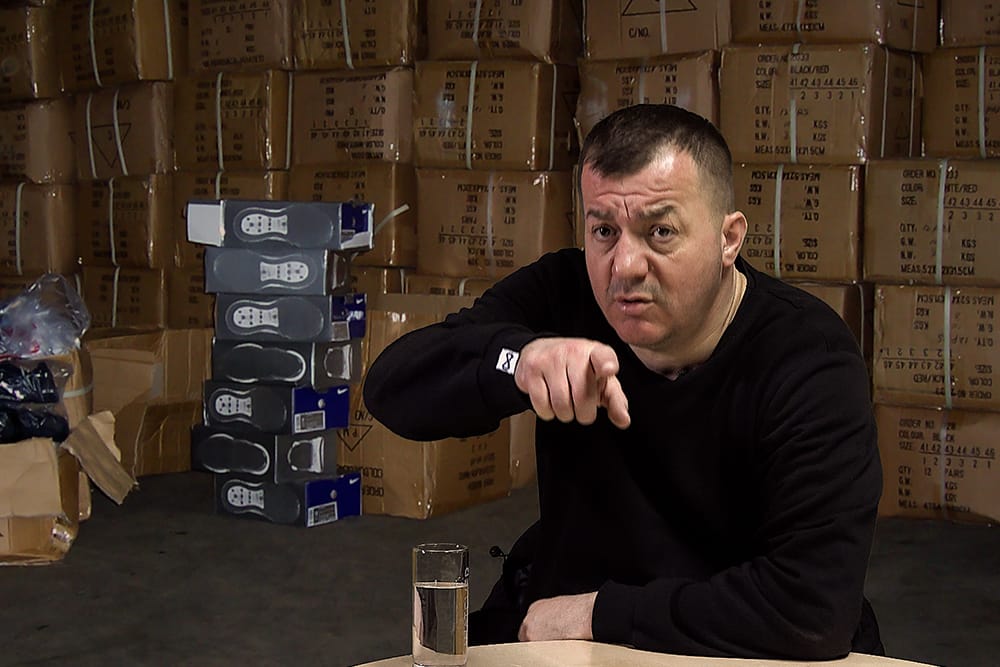
To make sure that customs officers will accept the papers with several times lower value of goods and skip the detailed inspection and counting, the importers plan in their calculations a “coffee gratuity cost” of BAM 2,500. Being only an alternate, Kastrat refused to pay a bribe.
“He could not handle the foreign trade business,” says his friend Kemal Čaušević, who advised him not to enter this business.
For his first import, Kastrat paid about a thousand BAM more for customs duty and continued to do business as usual. A month later, he went for another batch of textiles with the invoice indicating several times lower value. He recalls being invited by customs officers to a meeting through a friend, but he did not go. They inspected his goods, and let him go through without punishing him. After customs clearance, he received a call from freight forwarding agent Jelena Stanivuk.
“She said, this is how it is always going to be. Them not having raised the taxable base was a signal that you should sit at that table”, said Kastrat to CIN. Already at the next import, the customs officers lost patience.
Kastrat’s driver came to the border with three and a half tons of goods, which according to the invoice were worth about BAM 5.5 per kilogram – about four times cheaper than the average price per kilogram of Chinese textiles.
“The way they nailed him was ridiculous!”, Kastrat remembers. Customs officers raised the value of the goods by almost BAM 7,000.
The co-owner of Centrošped, Ljubiša Đurđević, who claims to avoid textile imports, agreed to take Kastrat’s case upon a recommendation from Sarajevo. He knew he had some problems, but he was not aware of Stanivuk asking him for a bribe: “I have never been a messenger nor do I want to become one. I don’t want to think about that part and I advise the same to my freight forwarding agents, my workers (…). That ‘coffee gratuity’ does not go to my account, and I cannot pay the salaries to the workers from that part.”
Kastrat complained to ITA BiH about inconsistencies in the work of customs officers. Although on the second and third occasions Kastrat imported goods of similar value, the customs officers treated them differently. He also referred to other importing companies. The company “SM Group” owned by Ansan Halilović and the company “Extrablatt” owned by Fehrat Pero Peštalić imported 4.6 tons of textiles on the very same day.
Their goods were also bought in Hungary and declared to the customs at a similar price, but the customs officers did not react to that. Kastrat’s complaint met with a wall of silence in the ITA BiH, so he pulled the ace out of his sleeve – he called Kemal Čaušević to help him resolve the complaint.
“When I realized that everyone was involved, I called in Čaušević (…) he went [there], and of course, I won,” Kastrat highlighted a still very strong influence of the former director of ITA BiH, who was in the meantime sentenced to nine years in prison for accepting bribes and customs fraud.
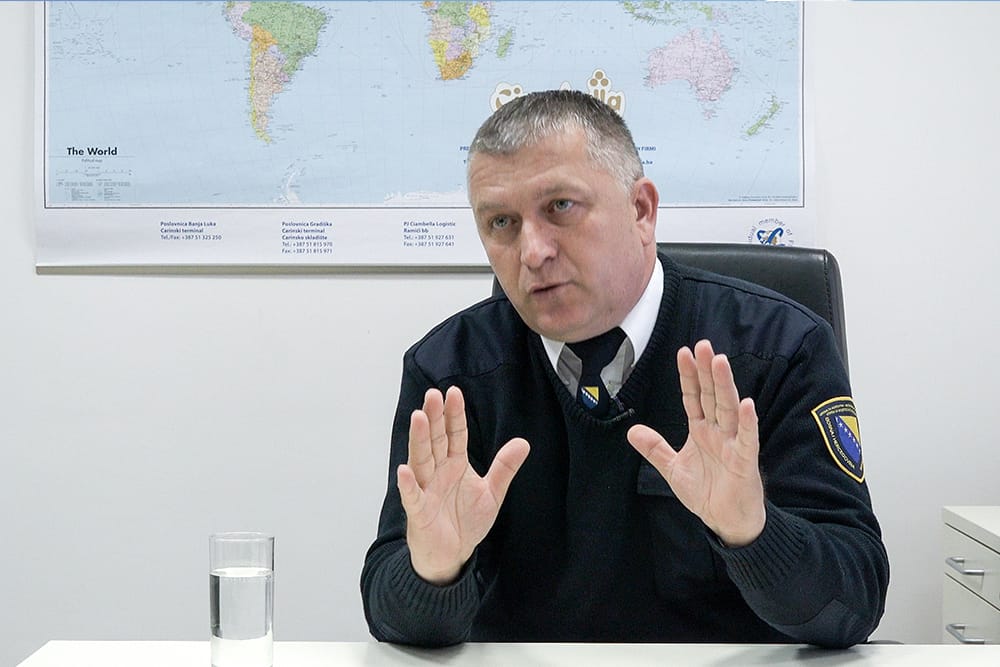
After that, ITA BiH revoked the customs’ decision increasing the taxable base and Kastrat got his money back. Although no internal investigation was conducted to this end, the head of the Gradiška customs office, Radovan Đurić, claims that no one asked Kastrat for a bribe.
“Are you saying that Esnaf’s prices are the right prices?” Đurić asked CIN reporters during the interview, forgetting that at the beginning of the conversation he claimed that he did not know that importers come to the customs with devalued invoices.
“Ok, we agree that the indicated prices are low, but let’s have someone say what the real price is”, says Đurić, explaining that it is not possible to know the real value of the goods based on which customs duty is charged.
Under the order issued by the director of ITA BiH, Miro Džakula, customs officers are required to thoroughly inspect all the incoming goods in the customs warehouses. They have three days to do it, and if established that the value is incorrect, they can correct it.
However, Vlado Macura from the forwarding company “Ciambella Export-Import” from Banja Luka says that this is not usually the case in the customs warehouses in Gradiška.
“More and more often they don’t look at it at all. They ask me ‘Did you count it, I say yes, I did, everything is OK”, says Macura.
Expensive coffee at the border
Sarajevan Edin Helać has been one of the largest importers of textiles in BiH for years. In seven years, together with Ismet Balija, his company “Europtimus” made 250 imports of textiles, which the state cleared at reduced values, thus depriving the budget of significant revenues.
“In order not to disband the consignment and raise the taxable base by 30 percent, they take a kickback of BAM 2,500 and leave the goods in the warehouse, as if it were inspected, said Helać describing the common way of importing textiles to BiH. “We send [an envelope] via a driver or someone, and then the driver hands it to the freight forwarding agent, and the freight forwarding agent hands it over to whom it is for.”
When the CIN reporter asked “Whom is it for?” He replied “Well, for the customs cartel.”
They also worked with Peštalić and his company “Extrablatt”, whose formal owner is his wife Semira. Helać quit the job last year, and today Peštalić is one of the largest importers of textiles from China and Turkey.
Several handwritten calculations for about 20 joint imports were left behind the cooperation between Peštalić and Helać. “These are our calculations, not the calculations between the companies”, says Helać.
Although the dates and amounts of the invoices on these papers correspond to the data held by ITA BiH on their imports, Peštalić does not admit the existence of any “handwritten” invoices.
On each of the papers, among the costs, there is a “coffee gratuity” of about BAM 2,500 and all the goods have been cleared through the customs office in Gradiška.
The responsibility of the customs is to ensure that BiH budget is not damaged by devalued charges. The head of the Gradiška customs office, Radovan Đurić, expects the importers to take care of that: “Why don’t they come with the real price, so we could sort the problem once and for all. … Esnaf or anyone of those boutique owners who complain about the enormous amounts they claim to pay to someone. In such case there will be no need to give anything to the customs officer, or Radovan, or the freight forwarding agent or anyone else, instead, they will pay it to the state and we’ll all be happy.”
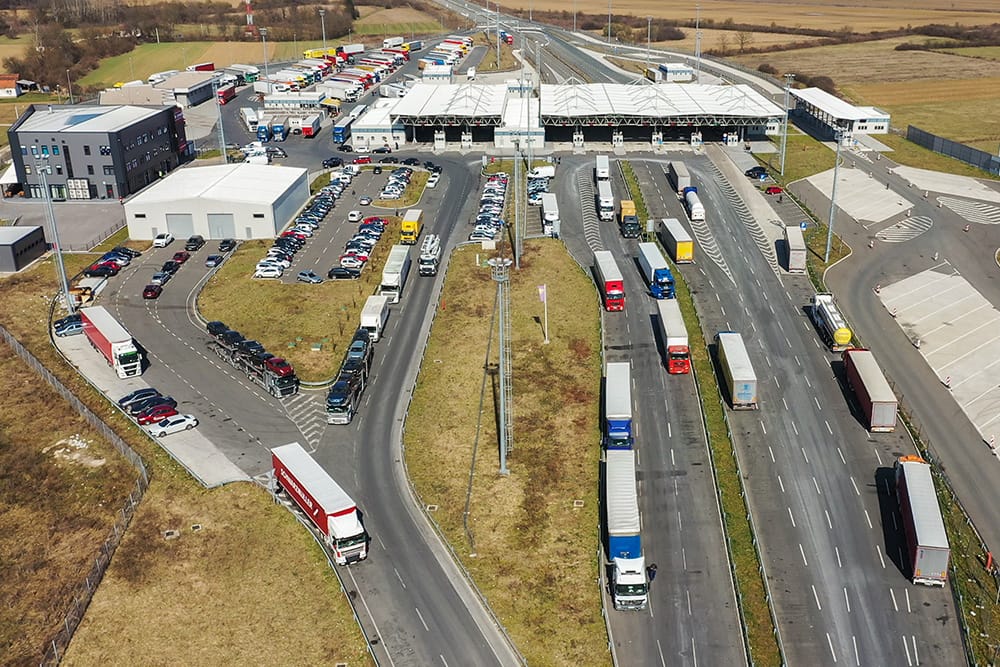
However, “coffee gratuity” indeed pays off to the importers. “For a full truck, if you have 20 tons, the difference is about 15 thousand BAM, and if they raise the taxable base for that… And you give BAM 2,500 as a coffee gratuity”, explains Helać.
Radovan Đurić claims that no bribes are taken at his customs office: “Have any one of them say to have given [a bribe] to my customs officers, I will press charges against such officer. “
But importers have no contact with customs officers. “You have to go through freight forwarding agents. No customs officer wants to talk directly to us”, says Edin Peljto, the owner of the company “F Gradnja”, which dozen times imported textiles, which were customs cleared at the significantly devalued price.
Although such allegations should have alarmed the head of the customs office, Đurić persistently declines them. “It is not given, until it is proven, we all talk about it hypothetically (…) you should ask the freight forwarding agents what kind of coffee gratuity they have been given.”
And the freight forwarding agents are silent. The owner of the freight forwarding company “Raleks tim” from Banja Luka, Aleksandar Aleksić, was arrested in 2015 due to customs fraud when importing textiles from China with Darko Šljivar, the beneficial owner of the shipping company “PVA group” and other associates. As learned from the wiretapped telephone conversations, they have been agreeing on forging the documents accompanying the goods to the BiH border, bribing customs officers and inspectors, and fictitious trade in goods. Aleksić refused to speak to CIN about the import of textiles to BiH because he says, he could end up “under the ice”, and other importers confirm that his fear is justified.
Those who spoke to CIN openly are no longer in the business. When they were working, they followed the course of least resistance, not complaining, aware of the thin line between loss and profit. If the customs officers would suddenly decide to thoroughly inspect the goods, they could destroy or confiscate them, hence the importers pay a bribe not only at the BiH border but also at all other borders.
“You drive someone’s goods worth EUR 200,000 – 300,000 and if you lose it, you have to compensate it (…) With those EUR 300,000 they make a clear profit of EUR 100,000. Giving away 20,000 or 30,000 for a safe passage is not a big deal”, explains the importer Peljto.
BAM 6 a kilogram
In 2019 and 2020, slightly less than 60 thousand tons of clothing were imported to Bosnia and Herzegovina from China and Turkey. According to the ITA BiH, based on these imports almost BAM 212 million were collected in customs duty.
“Each invoice contains information about the number of pieces – the number of T-shirts – based on which a total value is established and against which the goods are cleared”, explains Đurić, the head of the Gradiška customs office.
For importers, the unit price of items is not as important as the total value of the goods, which must not be lower than BAM 6 per kilogram. That is why the system is called “customs clearance per kilogram”.
From 2018 to April 2021, at least 420 imports of clothing and footwear from China were customs cleared through the customs office in Gradiška. The customs officers saw nothing wrong with the invoices, as the average price per kilogram of goods was exactly BAM 6.
ITA BiH claims not to have noticed it and that they do not have the lowest price per kilogram specified, as the law does not allow for it, however, the data on value, the importers, and the forwarding agents deny this.
Mišo Radmanović, agent of the freight forwarding company “Namit” says that the price of BAM 6 i.e., BAM 8 per kilogram is clearly prescribed and in line with the procedure. Avoiding to answer the question directly, Radmanović says that the price is prescribed by “someone at a higher level in the state”. ITA BiH Director Miro Džakula did not want to talk to CIN about this.
As three pairs of jeans can fit in a kilogram, a simple calculation leads to the conclusion that something is wrong with this type of customs clearance.
“You do not have to be a rocket scientist to see that a pair of trousers cost 15 Euro cents, and that something is wrong’ (…) One cannot buy a kilogram of jeans for three Euros. Cannot!”, concludes Peljto.
Although customs officers are authorized to increase the value of goods when they notice that it is not right – which they did twice to Esnaf Kastrat – Đurić claims that he has no arguments to support it. “The price is the same for all. On what basis would they raise his price?”
CIN reporters revealed that was not true. Namely, Chinese and Turkish clothing that citizens buy in some of the cheapest retail chains in our country, such as “New Yorker” and “LC Waikiki”, is imported at an average price of BAM 40 per kilogram.
Had the textiles in Gradiška been cleared according to the prices stated in the invoices of these importers, in less than three and a half years BiH would have received another BAM 38 million in customs duty for only three and a half thousand tons of textiles.
It looks like anything but business
Most of the imported Chinese and Turkish textiles are unloaded in the late evening hours at the markets of Arizona in Brčko and Porebrice in Gradačac. Located one next to another, these markets store the goods of most of the textile importers in BiH. This area is considered the golden center of cheap textiles in the country.
“Looking at it one would say it is a complete misery, but I’ll tell you that annually about BAM 400 million goes through that market”, says Saudin Porović, director of the company “Nova pijaca” responsible for running the Gradačac market.
“The clothing arrives here at the end of the week, and before the coronavirus, we would have up to 15 trucks each Thursday. Goods are unloaded expressly. Vehicles are coming, getting loaded, distributing, it looks like anything but business”, Porović describes the well-established chaos on the market.
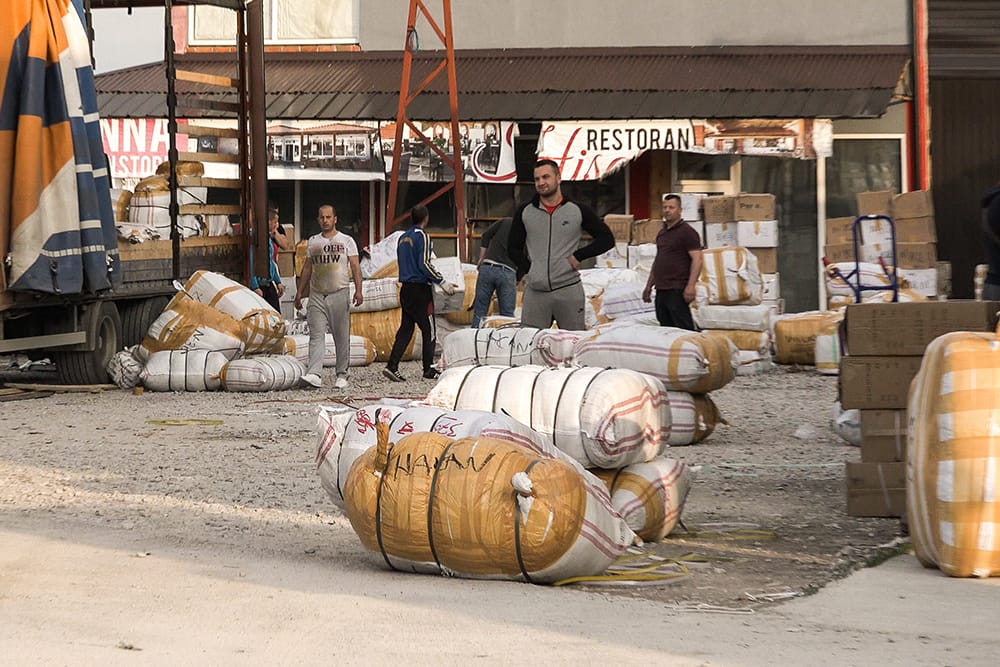
Actual buyers, mostly owners of boutiques and clothing stores in BiH, take over their goods here and pay the importers the transport fee of around BAM 1,000 per cubic meter of goods. A standard shipment is about fifty cubic meters of textiles. Transactions are paid in cash. Formally, issuing invoices for transportation would not be feasible because, from the point of view of financial institutions, Helać, Peljto, Peštalić, and others are not carriers but importers of textiles.
The invoices based on which the goods were cleared by the BiH customs the importers pay to the company which issued the invoice, but the company pays the money back to them, keeping a few percent as compensation for the service of legalizing goods purchased in cash.
CIN reporters tried to reach Pero Peštalić for several months, but he did not respond to calls and messages. They found him on the Gradačac market. He was there supervising the unloading of the truck of the newly arrived and cleared textile for company “Extrablatt”. Peštalić left as soon as the journalists appeared at the gate of the market. His workers apparently displeased with the presence of journalists, cussed them out demanding that the cameras be removed while they were unloading the goods.
The next morning, Peštalić was at the market again. Importers claim it is the day when the transportation fee is collected from the traders. Peštalić was standing in front of his shop in the company of councilor Miralem Kamberović. As soon as the journalists approached them, a dozen men gathered around them nearly ready to engage in physical contact.
At first, Peštalić did not want to talk: “I have known about you for two months and the stories you’ve been told. You go ahead and do your job, but that’s all in vain, I’m going to sue you for whatever you write.”
However, a little later, he agreed to talk, off-camera, in a small restaurant “Hisar”. The intolerant looks of the rare guests in the dark market building made it clear to the journalists that they were not welcome in this place. People from the market were aware that their cameras could ruin their business.
Unlike them, Peštalić sat confident and smiling. He portrayed himself to CIN reporters as a believer who makes a pilgrimage every year and does nothing illegal. He pays no bribe to anyone, just shares alms, which is why – he says – life is being good to him.
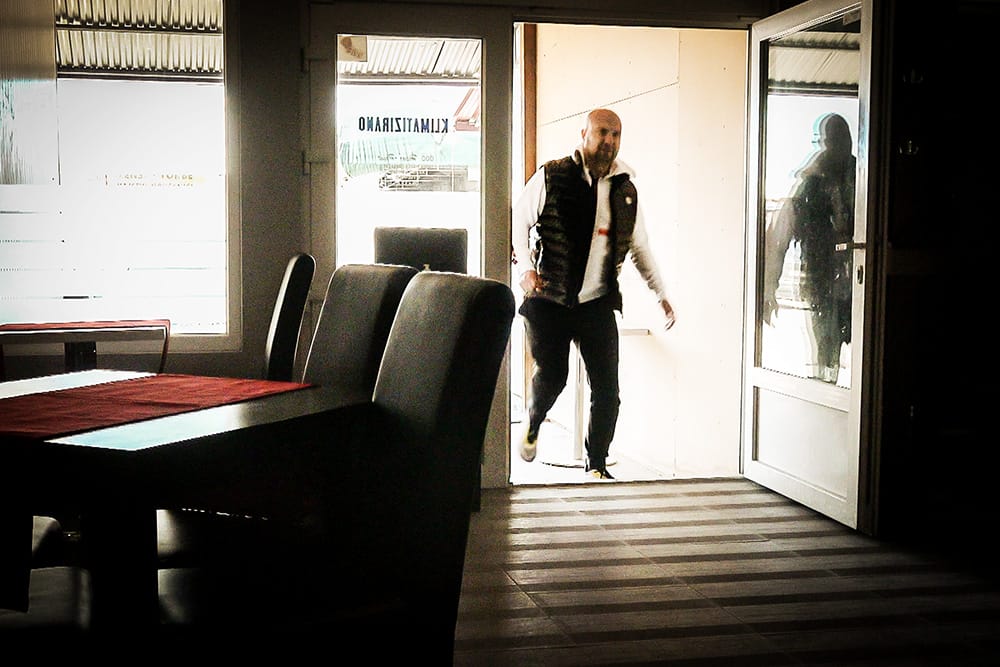
On the other hand, some traders at the market do not think so highly of Peštalić. Distrustful, they retreat in front of the CIN cameras, not wanting to talk openly about the work: “I’m sorry, I’d really help you, I would I swear but those rascals, that guy Besim and the other one, Pero Ferhat, they will send you their mobsters. Their mobsters came to me asking why am I not doing business with them but with other carriers, why is this other carrier cheaper than them. I do not know what to say, sorry. I would help you, I swear, but I need no trouble”, said one of the traders at the market.
Some stay away from cameras because of the illegal work they do. According to importers, many of them do not take the invoice for the goods they buy but trade exclusively in cash. “If you take the goods without an invoice, you will not enter it in your business ledger, hence you will not pay the output VAT nor will you pay profit tax at the end of the year”, explains Helać.
Therefore, when they distribute the goods, the importers think of ways of removing them from their business ledgers. Hence, they issue piles of fake cash register bills to clear out the goods from the books. If they fail with retail, they find companies to which they will fictitiously sell goods in bulk. Such companies are often registered in the name of the poor people with unknown addresses, whom tax inspectors cannot reach.
“In this way, the VAT obligation is transferred on the last person in the chain, who is unable to pay because they are insolvent”, says SIPA document on one of the investigations on the import and fictitious trade in textiles in the Arizona market.
Cash in your pocket and off you go across the border
Importers and boutique owners illegally take their earnings out of the country for new purchases and imports. Under the BiH regulation, as well as under the European regulation, citizens carrying more than EUR 10,000 must declare the amount and prove the origin of the money. That is why boutique owners, before going shopping, give a portion of the money to importers who transfer it across the border without declaring it.
CIN journalists discovered that Muharem Pavitinović, the formal owner and director of Brčko’s “Hisar Trade”, illegally transferred at least one million Euros from BiH in the first half of 2018 alone. At that time, this company imported nearly 430 tons of textiles a declared value of BAM 3.5 million.
For several months, nearly every Sunday he was leaving BiH carrying on the average EUR 75 thousand, never declaring any of it. At the entry to Serbia, he declared cash because foreign citizens in transit must do so, but are not required to prove their origin.
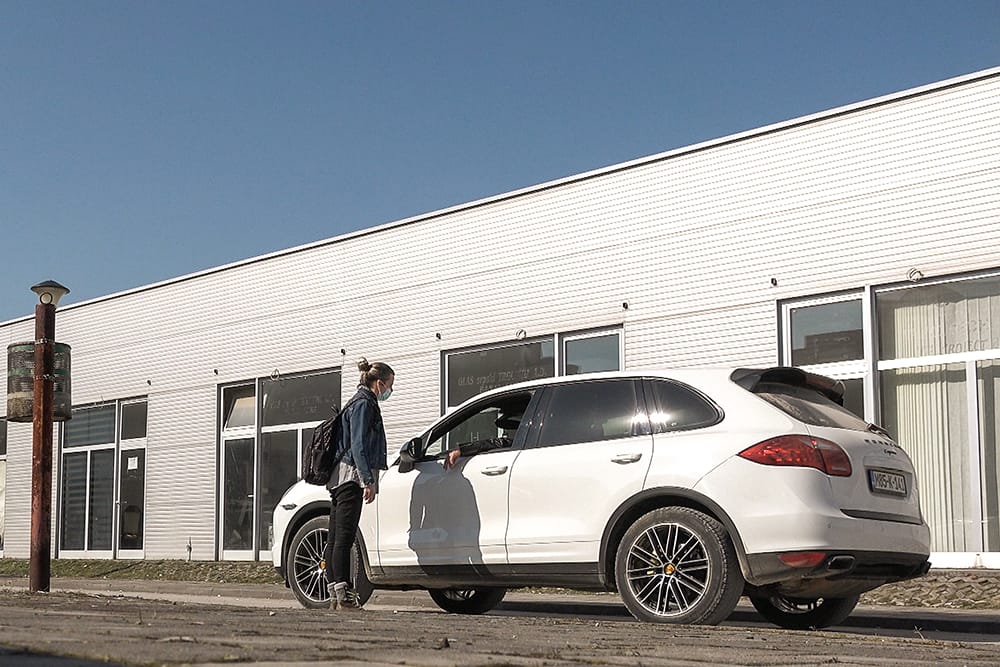
CIN reporters found Pavitinović at the “Arizona” market, but he did not want to talk about textile imports before he talks to his partner Nermin Jahić. He is the son of Besim Jahić, who is, according to SIPA and all CIN interlocutors, the sole owner of “Hisar Trade” and one of the largest importers, i.e., intermediaries in the import of textiles in BiH. However, Besim Jahić denies it.
“The beneficial owner is the one whose name is on the paper, who signs,” he claims, alluding to Pavitinović. “If SIPA has all the contacts proving that I am behind it, let SIPA do their job, and that’s all I can say”, Jahić told CIN reporters and hung up indignantly.
In 2010, he was sentenced to three years in prison for customs fraud and tax evasion. At that time, he was an employee of the company “Sidoil” owned by Sedinet Karić. Seven years later, SIPA inspectors suspected Jahić and Peštalić of forming “organized crime groups”, which were giving a bribe to unknown freight forwarding agents and customs officers who facilitated the import of textiles with reduced values and weight.
In 2017, SIPA arrested seven people who were released after three months in custody. Among them were Ferhat Peštalić, Edin Helać, Ismet Balija, Nermin Jahić, and Muharem Pavitinović. The Prosecutor’s Office of Bosnia and Herzegovina has not filed an indictment against them to date.
Peštalić claims they have been framed, and the investigations against them were rigged by their competition. According to him, some importers have never been investigated: “If what is being done is a crime, how come that they always arrest one or two, and let others go. I can’t be a goody, and Besim a baddie if both Besim and I do the same thing, right?”
Since 2014, SIPA has arrested 110 people for criminal offenses related to textiles – 20 of them from the ITA BiH. SIPA filed 33 reports to the Prosecutor’s Office of BiH against 280 persons and 98 companies.
Analyzing the situation regarding the import of textiles in BiH, SIPA inspectors in 2016 concluded that following the arrest of Čaušević, the model of illegal import and reduction of duties has not changed, hence suggested the following: “We hereby propose, as the main goal of the action, to prosecute the staff of the freight forwarding companies and customs officers all way to the highest levels in the hierarchy who receive money.”
All arrested ITA BiH officers are still working.
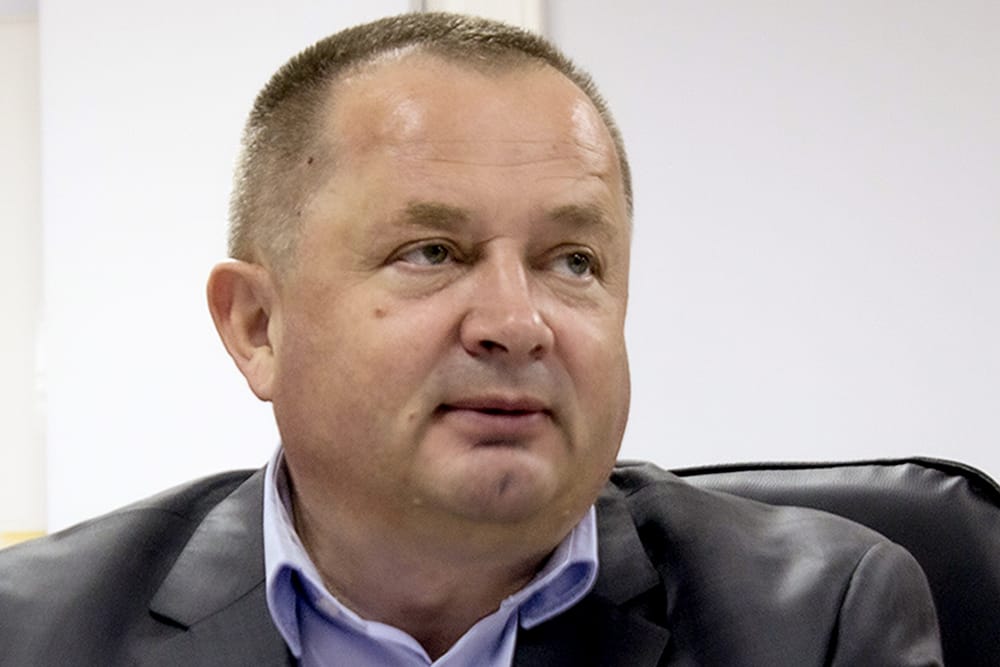
When asked about the years-long investigations that have not yet resulted in indictments, the BiH Prosecutor’s Office briefly responded that investigations are ongoing. The subject of one of them is the head of the Gradiška Customs Office, Radovan Đurić, against whom a warrant was issued in 2014. However, upon Đurić’s return to the country, the Prosecutor’s Office did not even bother to interrogate him. “I came to the Court of BiH, and I was sent home, that’s it. Nothing happened since then.”
Former director of ITA BiH, Kemal Čaušević was arrested in 2014 with textile importers Anes Sadiković,
Sedinet Karić and many other ITA BiH officers for import-related customs fraud, devaluation of customs duty, and giving and receiving bribes. In the first-instance proceedings, Čaušević was sentenced to nine years in prison, and Sadiković to two, while Karić pleaded guilty and was sentenced to one year in prison.

